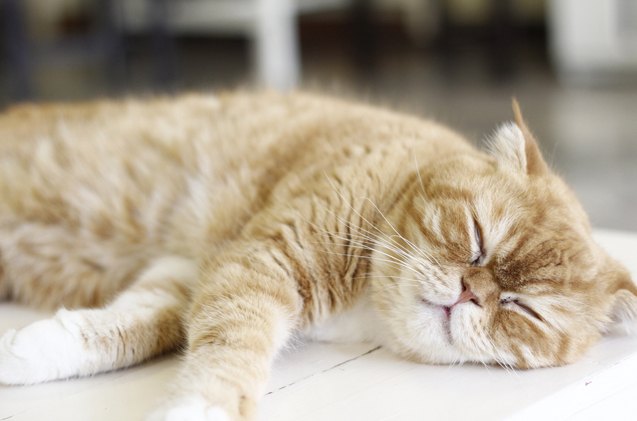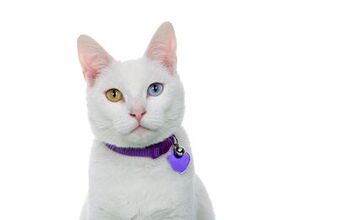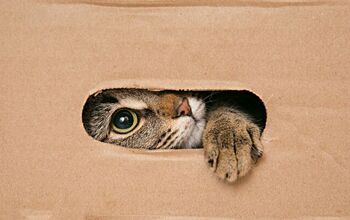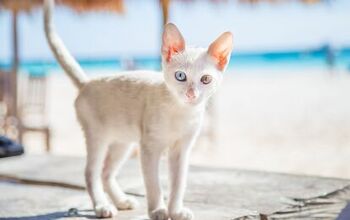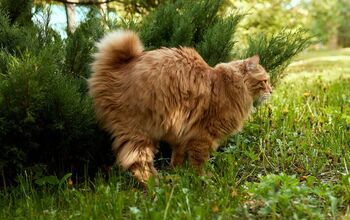Is It Normal for Cats to Snore?

It’s not unusual about hearing about dogs who like to cut logs while they get their beauty sleep. But what about cats – is it normal for kitties to snore?
Cats are strange creatures at times, as any cat owner will agree. Though being a cat owner can be challenging at times, it can also be rewarding–there is nothing better than snuggling up on the couch with your feline friend to watch a movie. But, sometimes, whether your cat is sleeping right next to you on the couch or snoozing away in his own pet bed, you might start to hear him making some odd sounds. Could it be that your cat is snoring? Yes, it can!
In keeping with their often-odd behavioral traits, some cats develop a tendency to snore. If you are new to cat parenting and you have never heard a kitty snoring before, you might wonder where those sounds are coming from when you hear your cat snoring for the first time.
Don’t worry, as cats aren’t terribly loud snorers. And if you have more than one feline friend, you might notice that the sounds they make vary a bit from one nap to another and from one kitty to another. Sometimes, your cat might be snoring quite loudly, while other times, it might be a faint snore. And, sometimes, your cat might even be twitching in his sleep, which might indicate that he is dreaming too.
Why do some cats snore and is it something you should be concerned about? We cover the answer to this common question below so you can get to know your feline friend a bit better.
Why Do Some Cats Snore?
Snoring is common in dogs, especially in brachycephalic or short-faced breeds. While there certainly are cats that snore, it is less common and it is usually caused by some sort of airway obstruction.
Related: Why Do Cats Sleep So Much?
In cats, the low-pitched snoring sound is known as stertor and it is the result of the soft tissue lining the nose and throat vibrating as the cat inhales or exhales. As is true for people, snoring in cats is sometimes related to the position in which the cat is sleeping, but it can also be the result of a medical problem that requires attention. If your kitty snores, it might be a good idea to take note of when the snoring occurs. For instance, is it when he is in what appears to be a deep sleep? Does he seem to snore when he is in certain positions?
What’s also interesting is that snoring might be something that occurs more often in certain breeds. For example, snoring is more common in flat-faced cat breeds like the Himalayan and the Persian, though any cat with a compressed facial formation may be prone to snoring. Cats with flat faces may have narrower nostrils than usual which can restrict the intake of air – they may also have an elongated soft palate that collapses into the airway with each inhale and exhale.
Another thing to consider is that obesity in cats can also increase the risk for respiratory disturbances or blockages which can contribute to snoring. To determine if your cat is at a healthy weight, or if he is overweight or obese, you can check his body condition score, weigh him on a scale, or simply consult a veterinarian.
When Should You Be Concerned?
Just like people snore, cats can snore as well, and this does not always indicate that there is a problem to be concerned about. Unless the snoring seems to be having a negative impact on your cat, you may not need to do anything about it. If, however, your cat is snoring because something is making breathing through the nose difficult and he is compensating with open-mouthed breathing, it is worth having him checked by your veterinarian.
Related: Do Cats Dream of Chasing Mice and Balls of Yarn?
Other signs that may indicate a problem include facial swelling, nasal discharge, coughing, sneezing, and a change in voice. These signs can be indicative of health problems like a bacterial or fungal infection, laryngeal paralysis, polyps or masses in the throat, inflammation, or a foreign body stuck in the airway. These are all issues that should be addressed by a veterinarian as soon as possible to prevent them from getting worse, so don’t hesitate to get expert guidance on how to help your cat. With the proper diagnosis, you can figure out what’s wrong with your pet and what treatments will be necessary.
What can you expect if you have to take your cat to the vet to discuss health problems that might be causing snoring as a symptom? Well, your veterinarian will likely perform a thorough physical exam and a review of your cat’s symptoms, so pay close attention to any changes your cat exhibits so you can report them. The more history you can provide on the symptoms your cat is experiencing, the better, so if you can explain when the snoring started or when you noticed changes in your cat’s snoring, that information could be helpful.
In some cases, your vet may also recommend x-rays to identify the problem. In severe cases that are particularly difficult to diagnose, your cat may need to be sedated for a closer examination. Once your vet identifies the problem he will recommend a course of treatment.
Snoring Can Be Normal for Cats
Generally, snoring in cats can be considered normal. If your cat has always snored, and you haven’t noticed any big changes in the way he snores, such as an increase in the frequency of snoring or in the loudness, it is probably fine. However, if you notice that there are other symptoms along with the snoring, it is worth talking to a veterinarian just to be sure your kitty doesn’t have any health concerns that need to be treated.
The bottom line is this: even though snoring is not automatically a cause for concern in cats, it can sometimes be a symptom for a serious health problem. It is always a good idea to pay attention to your cat’s behavior and to report any concerning changes to your veterinarian, even if they seem insignificant. It is always better to be safe than sorry.

Kate Barrington is the loving owner of two cats (Bagel and Munchkin) and a noisy herd of guinea pigs. Having grown up with golden retrievers, Kate has a great deal of experience with dogs but labels herself a lover of all pets. Having received a Bachelor's degree in English, Kate has combined her love for pets and her passion for writing to create her own freelance writing business, specializing in the pet niche.
More by Kate Barrington



